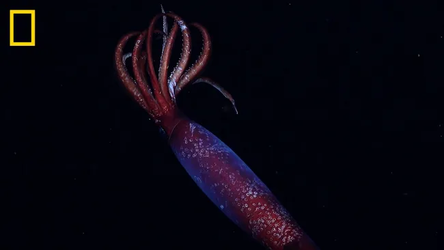Haunting blood-red squid with large hooks drifts through Antarctic ocean's midnight zone in world-first video
Researchers have filmed a living Antarctic gonate squid in a world-first sighting deep in the ocean surrounding Antarctica.

Researchers recorded the first-known sighting of a living Gonatus antarcticus as part of the National Geographic and Rolex Perpetual Planet Expedition.
An elusive species of deep-sea squid has been seen alive for the first time off Antarctica, National Geographic has announced.
Researchers filmed the Antarctic gonate squid (Gonatus antarcticus) drifting through the black waters of the ocean's midnight zone, 7,060 feet (2,152 meters) below the surface, on Dec. 25, 2024.
As first reported by National Geographic, researchers spotted the 3-foot-long (0.9 m) blood-red creature using a remotely operated vehicle (ROV), which had been deployed from the Schmidt Ocean Institute’s research vessel, the R/V Falkor (too). They sent the footage to Kat Bolstad, head of the Lab for Cephalopod Ecology and Systematics at Auckland University of Technology in New Zealand, who confirmed it was an Antarctic gonate squid.
"This is, to the best of my knowledge, the first live footage of this animal worldwide," Bolstad told National Geographic.
Scientists have known about the Antarctic gonate squid for more than 100 years, but they have previously only seen dead specimens caught in fishing nets or beaks that had been preserved in the stomachs of other animals. This is the first time scientists have observed the squid alive and in its natural habitat.
The creature was in the bathypelagic or midnight zone, 3,300 to 13,100 feet (1,000 to 4,000 m) below the ocean's surface. No sunlight can penetrate that far into the ocean, so the midnight zone's only light comes from animals that can illuminate themselves with bioluminescence, according to the National Oceanic and Atmospheric Administration (NOAA).
The squid released a cloud of greenish ink when the ROV approached, potentially startled by the presence of a large, bright vehicle in its environment. The researchers followed the animal for a few minutes, using the ROV's lasers to measure its size, before the squid shot away into the darkness, National Geographic reported.
While researchers couldn't determine the sex or age of the animal, Bolstad confirmed it was an Antarctic gonate squid by observing the presence of a single, large hook on the ends of its two longer tentacles.
"The impressive tentacle hooks are probably used for grasping and subduing prey during ambush predation," Alex Hayward, a senior lecturer in ecology and conservation at the University of Exeter in England who was not involved in the expedition, told National Geographic.
